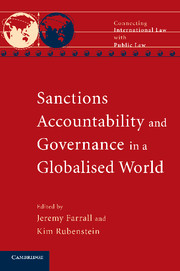Book contents
- Frontmatter
- Contents
- Contributors
- Series editors' preface
- Editors' preface
- Introduction: Filling or falling between the cracks? Law's potential
- PART I Setting down the foundations
- PART II Internationalising public law
- 3 Globalisation and public law: A global administrative law?
- 4 The deliberative deficit: Transparency, access to information and UN sanctions
- 5 Who guards the guardian? Towards regulation of the UN Security Council's Chapter VII powers through dialogue
- 6 Holding the United Nations Security Council accountable for human rights violations through domestic and regional courts: A case of ‘be careful what you wish for’?
- PART III Implementing Security Council sanctions
- PART IV The place of corporations
- PART V The role of lawyers
- PART VI Public law and public policy
- PART VII Parallel case studies
- Concluding remarks
- Bibliography
- Index
3 - Globalisation and public law: A global administrative law?
Published online by Cambridge University Press: 05 October 2010
- Frontmatter
- Contents
- Contributors
- Series editors' preface
- Editors' preface
- Introduction: Filling or falling between the cracks? Law's potential
- PART I Setting down the foundations
- PART II Internationalising public law
- 3 Globalisation and public law: A global administrative law?
- 4 The deliberative deficit: Transparency, access to information and UN sanctions
- 5 Who guards the guardian? Towards regulation of the UN Security Council's Chapter VII powers through dialogue
- 6 Holding the United Nations Security Council accountable for human rights violations through domestic and regional courts: A case of ‘be careful what you wish for’?
- PART III Implementing Security Council sanctions
- PART IV The place of corporations
- PART V The role of lawyers
- PART VI Public law and public policy
- PART VII Parallel case studies
- Concluding remarks
- Bibliography
- Index
Summary
In the space of a generation, the term ‘globalisation’ has passed from neologism to cliché. As a commercial phenomenon and political reality, the elision of traditional national borders has opened economies and transformed the context within which political decisions are made. Analysis and critique tend to focus on these two aspects of globalisation: the economic winners and losers, and the distancing of representative government from a great deal of political decision-making. This is understandable since international agencies, expert committees and hybrid interest-driven networks increasingly make decisions that affect large numbers of people. As formerly public responsibilities have been assumed by these new entities, however, there is evidence of an emerging normative context within which such activity takes place, characterised by a demand for accountability in decision-making. Responses to this demand have been piecemeal, sometimes inconsistent, and frequently inadequate. But seen as a whole, those responses have begun to coalesce into an entirely new area of law that may provide a set of rules for accountability in globalisation: a global administrative law.
This phenomenon lies in the interstices of what Peter Danchin describes as the traditional concept of ‘public’ in public international law, and the traditional Westphalian conception of the domestic sphere outlined by Charles Sampford elsewhere in this volume. Whereas Danchin presents a nuanced theoretical critique of the assumptions that underlie ‘internal’ and ‘external’ rationalities, and Sampford exposes tectonic shifts in how legitimacy operates in a post-Westphalian world, this chapter has the more modest task of mapping globalisation as a phenomenon, focusing in particular on the sporadic and at times inconsistent moves towards accountability in this sphere of action.
- Type
- Chapter
- Information
- Publisher: Cambridge University PressPrint publication year: 2009

